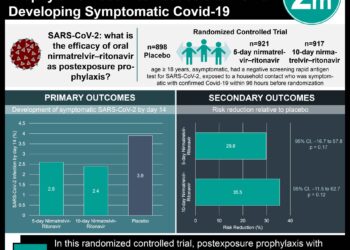Prior SARS-CoV-2 infection is associated with protection against reinfection
1. Previous infection from SARS-CoV-2 was linked to an 84% lower incidence of reinfection.
2. Median interval between primary infection and reinfection of COVID-19 was greater than 200 days.
Evidence Rating Level: 2 (Good)
Study Rundown: While it has been suggested that a history of SARS-CoV-2 infection confers protection against subsequent infection, little is known about the degree and length of protection acquired from natural infection. This multicenter prospective cohort study enrolled healthcare workers, support staff, and administrative staff working at hospitals who could remain enrolled for at least 12 months of follow-up. Participants were required to complete questionnaires on symptoms and exposures every two weeks as well as undergo SARS-CoV-2 PCR and antibody testing every two to four weeks. This study found that there was a nearly 84% reduced risk of infection in individuals with prior infection or who were antibody-positive at enrollment as opposed to those who had not been infected previously. Study results further suggested at least a seven-month window of protection against infection. This study was strengthened by its large number of subjects and the length of follow-up. Nevertheless, this study is observational and as such, does not control the probability or degree of exposure to SARS-CoV-2 each individual experienced. With vaccine availability increasing steadily, future studies may look to compare the protective effects of antibodies from a natural infection and those derived from vaccinations.
Click to read the study in the Lancet
Relevant Reading: What we know about covid-19 reinfection so far
In-Depth [prospective cohort]: This observational study utilized a longitudinal prospective cohort to assess the risk of SARS-CoV-2 reinfection. This study enrolled hospital staff from NHS hospitals across the UK from June 18, 2020, to Dec 31, 2020; 25,661 participants were utilized in the subsequent analysis. Data was collected up to and including Jan 11, 2021. Subjects were divided into the two cohorts that had either tested positive or not previously tested positive for SARS-CoV-2. Specifically, the positive cohort included those who were antibody positive on or before enrollment or had a positive PCR result before enrollment. The negative cohort included those with prior negative antibody tests and no prior positive PCR or antibody test. Reinfections were clinically determined given the certainty of diagnosis and symptom status, according to testing and medical records. Of those in the previously positive and negative cohorts, the infection rates were 1.87% (155/8,278) and 9.80% (1,704/17,383), respectively. An adjusted incidence rate ratio (aIRR) was calculated for each cohort concerning period and site to conclude that reinfection risk was reduced by at least 84% (aIRR 0.159, 95%CI [0.13–0.19]). For those with a PCR-confirmed reinfection, the median time between the primary infection and reinfection positive tests was 201 days (range, 95-297).
Image: PD
©2020 2 Minute Medicine, Inc. All rights reserved. No works may be reproduced without expressed written consent from 2 Minute Medicine, Inc. Inquire about licensing here. No article should be construed as medical advice and is not intended as such by the authors or by 2 Minute Medicine, Inc.







